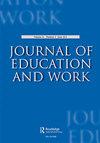专题导论:毕业生职业生涯中的职位与社会不平等
IF 1.7
Q2 EDUCATION & EDUCATIONAL RESEARCH
引用次数: 1
摘要
这期题为“毕业生职业中的地位和社会不平等”的特刊关注的是高等教育(HE)毕业生作为非常理想工作的特权居住者的地位变化。由于高等教育的全球扩张,现在在拥挤的毕业生劳动力市场上有一个庞大而多样化的毕业生群体,鉴于高技能高薪工作的扩张幅度较小,只有一小部分毕业生将获得领导职位和最高收入者的行列(例如Figueiredo et al. 2017;Tholen 2017;Brown, Lauder, and Ashton 2011)。最近的劳动力市场冲击使得毕业生进入劳动力市场和职业发展轨迹更加复杂。在过去二十年中,我们经历了2008年的全球经济危机,2020-2022年的COVID-19大流行,以及最近地缘政治武装冲突对毕业生劳动力市场(部分)的影响。毕业生劳动力市场机会的分布以及证书在促进获得所需就业形式方面的传统作用正在不断变化(例如Brown和Souto-Otero 2020;Tholen 2020;汤姆林森2017;Isopahkala-Bouret和Ojala 2022)。在不断变化和不确定的劳动力市场条件下,现在是时候问一下毕业生的职业生涯实际上是如何发展的了。此外,毕业生劳动力市场内的社会不平等是最紧迫的问题之一,需要以关键和全面的方式进行调查。在供大于求的劳动力市场中,职位竞争被认为会加剧(Brown, Hesketh, and Williams 2004),这意味着劳动力市场的机会越来越多地取决于毕业生相对于其他毕业生竞争者的价值表现。然而,毕业生就业的职位竞争往往变成了一种机械的排队过程,通过这种过程,教育证书的供求得到协调。我们需要对社会,文化有更深刻的理解本文章由计算机程序翻译,如有差异,请以英文原文为准。
Introduction to the special issue: positionality and social inequality in graduate careers
This Special Issue entitled Positionality and social inequality in graduate careers concerns the changing status of Higher Education (HE) graduates as privileged occupants of highly desirable jobs. As a result of the global expansion of higher education, there is now a large and diversified body of graduates in a crowded graduate labour market and, given the less dramatic expansion of high-skilled well-paid jobs, only a fraction of them will attain the leading positions and the ranks of top earners (e.g. Figueiredo et al. 2017; Tholen 2017; Brown, Lauder, and Ashton 2011). The recent labour market shocks have made graduates’ labour market entry and career trajectories even more complex. Within the last two decades, we have seen the global economic crisis in 2008, the COVID-19 pandemic in 2020–2022, and, more recently, the influence of geopolitical armed conflict hurting (sections of the) graduate labour markets. The distribution of graduates’ labour market opportunities and the traditional role of credentials in facilitating access to desired forms of employment is in flux (e.g. Brown and Souto-Otero 2020; Tholen 2020; Tomlinson 2017; Isopahkala-Bouret and Ojala 2022). Within changing and uncertain labour market conditions, it is timely to ask how graduate careers actually develop. Furthermore, social inequality within the graduate labour market is among the most pressing issues to investigate in a critical and comprehensive manner. In labour markets where the supply outstrips the demand, positional competition is thought to be heightened (Brown, Hesketh, and Williams 2004) meaning that labour market opportunities increasingly will depend on how well graduates can signal their worth relative to other graduate competitors. Yet too often the positional competition for graduate jobs has become rather a mechanical queuing process through which supply and demand of educational credentials are coordinated. We need to have a more sophisticated understanding about the social, cultural
求助全文
通过发布文献求助,成功后即可免费获取论文全文。
去求助
来源期刊

Journal of Education and Work
EDUCATION & EDUCATIONAL RESEARCH-
CiteScore
2.70
自引率
14.30%
发文量
40
期刊介绍:
The Journal of Education and Work is an international forum for academic research and policy analysis which focuses on the interplay of the education and economic systems. The journal examines how knowledge, skills, values and attitudes both about and for work and employment are developed within the education system. The journal also explores the various forms of industrial training and accreditation in the economic system, including changes in the economic and industrial infrastructure which influence the type of employees required. Work in the informal economy is also included.
 求助内容:
求助内容: 应助结果提醒方式:
应助结果提醒方式:


